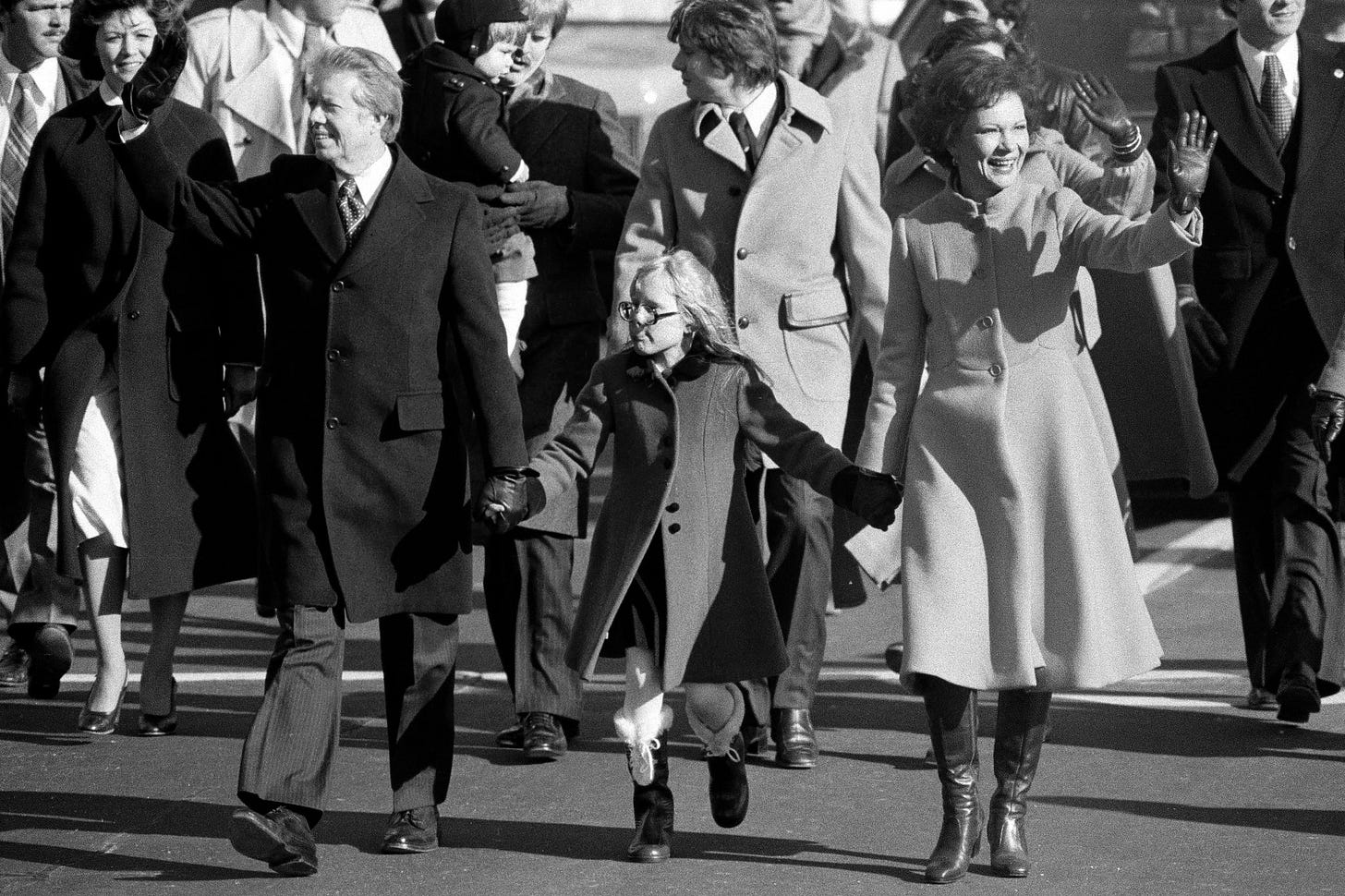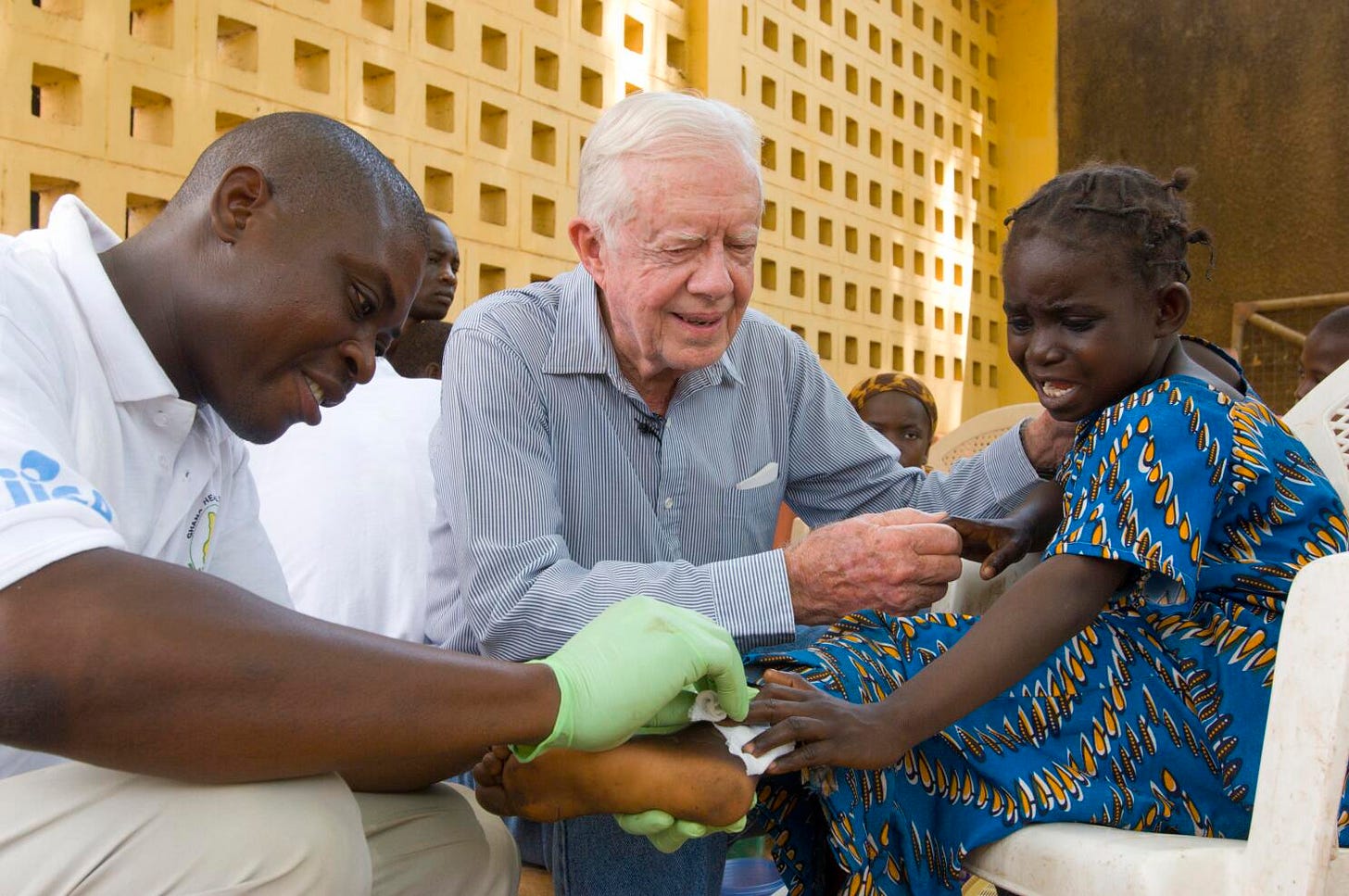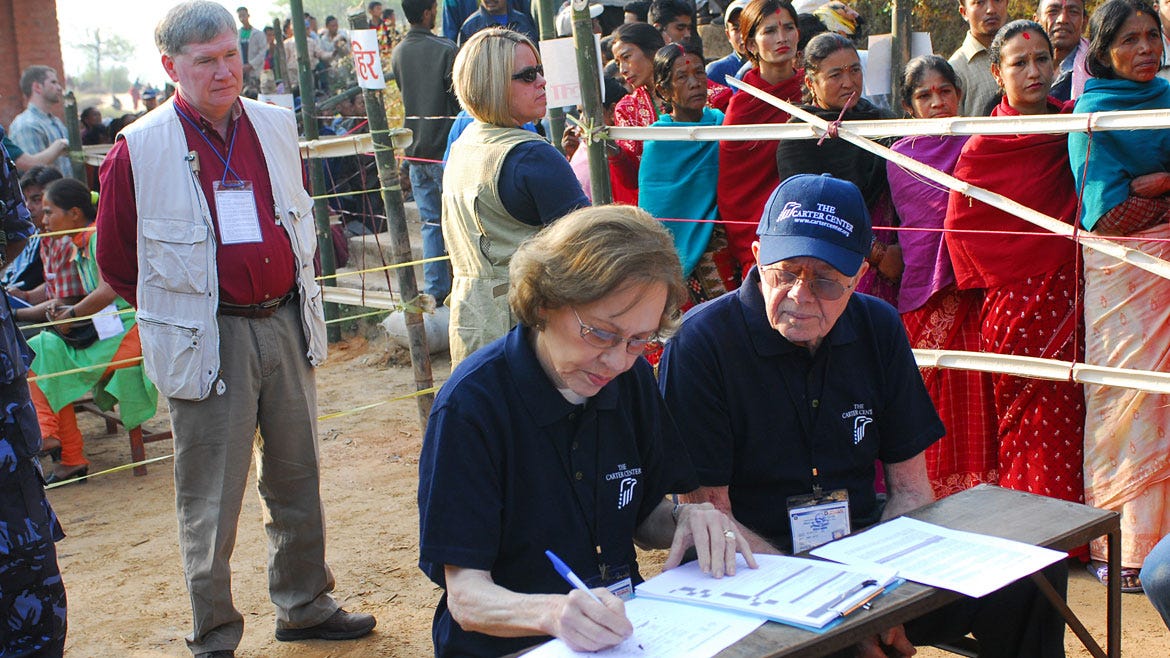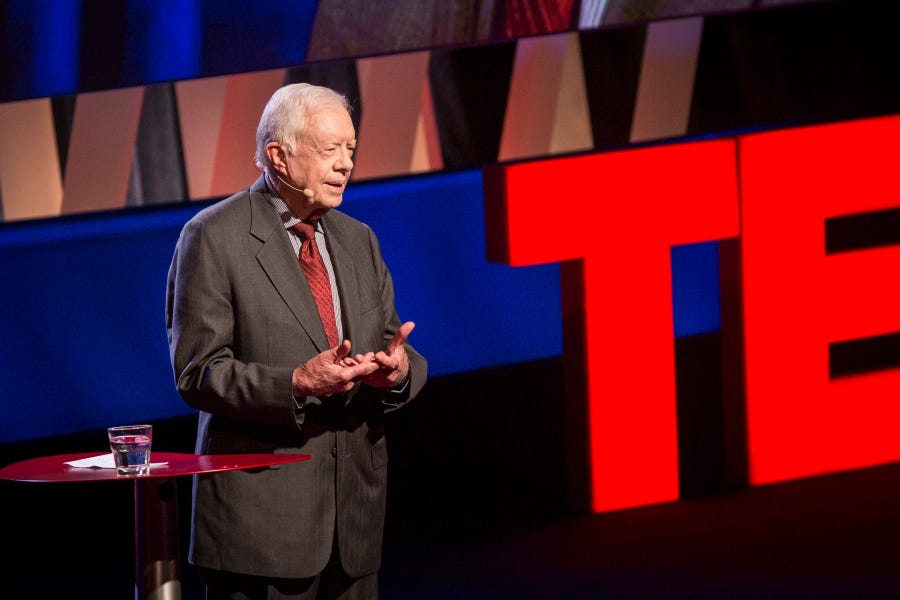Impact After Office
Jimmy Carter did more out of office than he did in the White House
As the crowds waved, the limousine carrying the newly-inaugurated Jimmy Carter came to a stop. President Carter wanted to get out out, to feel the January air on his face, and to let the American people see him. Carter, the son of humble peanut farmers and a veteran of the Navy, was a Washington outsider, and getting out of the car delighted the people who lined the route from the Capitol to the White House.
As an outsider, Carter was committed to meeting the everyday American where they were at, and weeks before his inauguration, he had an idea of how to do it. He wrote in his diary that he wanted to walk in the inaugural parade in order to convey “confidence in the people of our country” and “a reduction in the imperial status of the president and his family.” It was the first time a president had walked the route, and it’s a tradition that continues today.
Over the next four years, Carter helped create the Departments of Education and Energy, brokered a historic peace agreement between Egypt and Israel that lasts to this day, expanded national parks and wildlife refuges, and returned the Panama Canal to Panama.
Things were not rosy domestically, though. The country was plagued with stagflation and a sagging economy. And then, 52 Americans were taken hostage in Iran for 444 days, and Carter’s administration was unsuccessful in getting them released. His approval rating dropped into the low 30s. In 1980, he lost his re-election bid to Ronald Reagan.
For some, that might have been it. Perhaps they might have been satisfied with once having occupied 1600 Pennsylvania Ave, or maybe they would have retreated to lick their wounds in a private humiliation.
But that’s not who Jimmy Carter was. The same man who got out of his car to walk among the people went on to have the most consequential life after power of any president.
On Dec. 29, 2024, Earl James Carter Jr. died after nearly two years in hospice. He was the only former president to make it to 100 years old. Various services have been happening for the past week, but his state funeral is scheduled for today in Washington, DC. He will lie in state at the US Capitol rotunda until Tuesday, and then he will be laid to rest in Georgia next to Rosalynn, to whom he was married for 77 years.
And while the services will honor his presidency (funerals are planned by the former president themselves) much of the memorializing of Carter is focused on what he did afterward.
The Carter Center
After he lost re-election, Carter told the American public he would leave Washington and “take up once more the only title in our democracy superior to that of president — the title of citizen.” In 1982, he and Rosalynn founded the Carter Center, a nonprofit human rights organization focused on relieving human suffering around the world. One of their biggest areas of success has been in public health. Carter saw good health as a fundamental human right, and the Center focuses on eradicating disease, delivering medicines to communities that need them, and improving mental healthcare and access.
Carter zeroed in on the guinea-worm disease, a painful infection with no vaccine or treatment caused by a parasite in water. In 1986, about 3.5 million people around the world were affected, mostly in communities in Africa and Asia. In 1988, Carter saw the parasite in action firsthand, writing, “Once you’ve seen a small child with a two- or three-foot-long live Guinea worm protruding from her body, right through her skin, you never forget it.”
Carter said he wanted the last guinea worm parasite to die before he did. He got close — the Carter Center says they have led a coalition that has reduced instances of the disease by 99.99%, “making it likely to be the first human disease since smallpox to be eradicated.” In 2024, the Center reported only seven cases.
Peter Hotez, co-director of the Texas Children's Hospital Center for Vaccine Development and dean of the National School of Tropical Medicine at Baylor College of Medicine, worked with Carter.
Hotez said Carter’s attention on diseases that mostly affected the “world's poor… it really held elected leaders and leaders of foreign countries' feet to the fire, both in terms of low- and middle-income countries, as well as at the advanced countries, high-income countries, to really pay attention to these illnesses.”
Worldwide Democracy
Beyond advancing public health, Carter remained passionate about participating in democracy and making sure there were free and fair elections across the globe. Shortly after he left the White House, there were reports of armed militias stealing voting records in Panama. Carter was alarmed, and so he led a delegation to the country, where, Carter said, “in my fumbling Spanish, I stood up on a table, and I denounced the election as fraudulent. There was later another election, which was honest and fair, and that was the birth of real democracy in Panama.”
The Center has continued this work for decades. In one instance in 2008, the Center oversaw an election in Nepal in which an assembly was tasked with writing the country’s constitution. But the country’s political parities were deadlocked and couldn’t come to an agreement on moving the process forward. They finally established an election day and that day, Carter himself visited dozens of polling stations and talked to voters.
“His presence itself was a message to the Nepalese population and votes about the integrity of the election,” said Bhojraj Pokharel, Nepal’s chief election commissioner in 2008.
Since 1982, the Carter Center has sent observers to about 125 elections in 40 countries and three tribal nations. David Carroll, head of the center’s democracy program, said Carter’s “moral authority, the trust people put in him and the credibility of someone who had both won and lost an election” helped the Center succeed at this work.
The Center has even focused on US elections, including when the Cheyenne and Arapaho tribes asked for help. In 2013, ballots had been stored without proper security, and tribal members were worried about the integrity of the ballots, which led to a recount. So in 2017, the Carter Center sent teams to the tribes to monitor the ballots. Gov. Reggie Wassana said the Carter Center made “a huge difference, and it restored some faith among tribal members.”
Habitat for Humanity
Every year since leaving the White House, Jimmy and Rosalynn spent at least one week with Habitat for Humanity, a group that builds and improves homes for communities and people in need. Carter became so recognized as part of the organization that people began to think he created it. And though he didn’t start the organization, he did help it grow. Founders Millard and Linda Fuller said President Carter’s involvement “was like a rocket taking off. We went from several hundred thousand names to several million names in our database of supporters.”
Since its founding in 1976, Habitat has built or improved homes for 62 million people. Carter helped with 4,447 homes in 14 countries, including India, the Philippines, the US Gulf Coast, China, Cambodia, Vietnam, and more.
Carter said, “Habitat has successfully removed the stigma of charity by substituting it with a sense of partnership. The people who will live in the homes work side by side with the volunteers, so they feel very much that they are on an equal level.”
His dedication to the group was so strong that he refused to miss a Habitat trip in Nashville in 2019 even after an accident at home resulted in 14 stitches and a black eye. That year, Carter, bandaged but ready, and Rosalynn stood side-by-side, screwing front porches together.
Violence against women and children
Carter also focused his time and energy on women’s rights around the world. For decades, he spoke of the need to empower women and girls and to stop men’s violence against women. In 2014, he wrote a book, A Call to Action: Women, Religion, Violence and Power, in which he said that gender inequality is the leading cause of violence against women and children. He implored readers to look at the patriarchal beliefs deeply embedded around the world, including in some religious traditions.
He wrote, “At the Carter Center … we have learned about the vital role that liberated women can play in correcting the most serious problems that plague their relatives and neighbors. Almost everywhere, we find that women are relegated to secondary positions of influence and authority within a community but almost always do most of the work and prove to be the key participants in any successful project.”
His 2015 TED Talk was called “Why I Believe the Mistreatment of Women Is the Number One Human Rights Abuse.” In it, he said, “The average man that might say, ‘I’m against the abuse of women and girls,’ [but] quietly accepts the privileged position that we occupy. This is very similar to what I knew when I was a child, when separate but equal had existed. Racial discrimination, legally, had existed for 100 years…during that time, there were many white people that didn’t think that racial discrimination was okay. But they stayed quiet, because they enjoyed the privileges of better jobs, unique access to jury duty, better schools, and everything else, and that’s the same thing that exists today, because the average man really doesn’t care. Even though they say, ‘I’m against discrimination against girls and women,’ they enjoy a privileged position.”
His guiding light
Carter was perhaps the most religious president in US history. Raised a Baptist, his father was a deacon at the Southern Baptist Convention. Carter taught Sunday school until he was no longer physically able, and he’d hand out Bibles to families when he was done building or improving a home through Habitat for Humanity.
Carter once told an interviewer that on the hardest of days, he would sometimes pray 25 times. He called himself a born again Christian, and never shied away from how his faith beliefs impacted his political life.
Jim Wallis, an evangelical theologian and the faculty director of the Georgetown University Center on Faith and Justice said, “You hear a lot about how [Carter] was the best ex-president and how his four decades of humanitarian work probably accomplished more than any president. But what you may not hear is the reason for all of it. And the reason wasn’t some vague notion of public service. Everything for him was about his faith. That was his motivation for everything he did.”
In Carter’s book, Faith, he wrote, “There is one incontrovertible act concerning the relationship between Jesus Christ and women. He treated them as equal to men, which was dramatically different from the prevailing custom of the times.”
This belief in God’s equality for genders led to him parting ways with the Southern Baptist Convention in 2000 because he believed that they were not practicing true Christian values. In a letter to the congregation, Carter wrote that the group’s ruling to bar female deacons and force wives to “submit graciously" to their husbands “violate the basic premises of my Christian faith.”
He wrote, “I personally feel the Bible says all people are equal in the eyes of God. I personally feel that women should play an absolutely equal role in service of Christ in the church.”
Nobel Prize
In 2002, Carter won the Nobel Peace Prize "for his decades of untiring effort to find peaceful solutions to international conflicts, to advance democracy and human rights, and to promote economic and social development.”
During his acceptance speech, Carter said, “The bond of our common humanity is stronger than the divisiveness of our fears and prejudices. God gives us the capacity for choice. We can choose to alleviate suffering. We can choose to work together for peace. We can make these changes—and we must.”













When I was teen in the 80s and complained about having to help or babysit my siblings or whatever it was I didn’t want to do, going on and on about how put upon I was, my mother would say, “Get off the cross my little martyr, Jimmy Carter needs the wood.” 😂 It was a funny reminder of how much others gave and to quit my complaining. Clearly, it’s stuck with me and I still say it to myself when I fall into the martyr trap. 🤭
What a truly good human being President Carter was. He did the next needed thing his whole life. He is someone that I can proudly say I’ve always looked up to and who I have learned from. Even at the tender age of eight, I was outraged that he lost his reelection bid. I could see his servant leader heart and knew that he wasn’t the person who said what you wanted to hear, he told the truth. He took responsibility for his words and deeds. He will be missed but I’m grateful for the opportunity to have lived when he did and to have born witness to his good works. And of course, I’m grateful for the reminder that there is work to be done so quit complaining and help. ❤️
The fact that he openly spoke about violence against women, and left his church because he didn't think they were living Christian principles speaks volumes. The way his actions lined up with his words is something we need more of today. <3